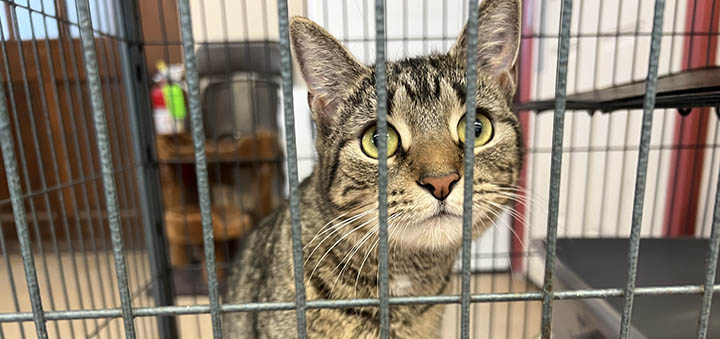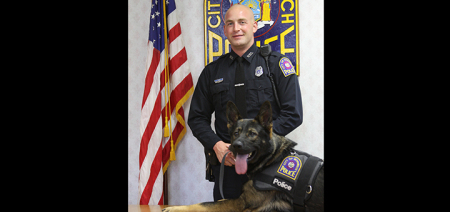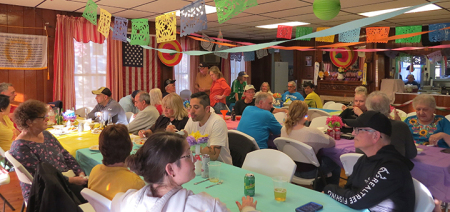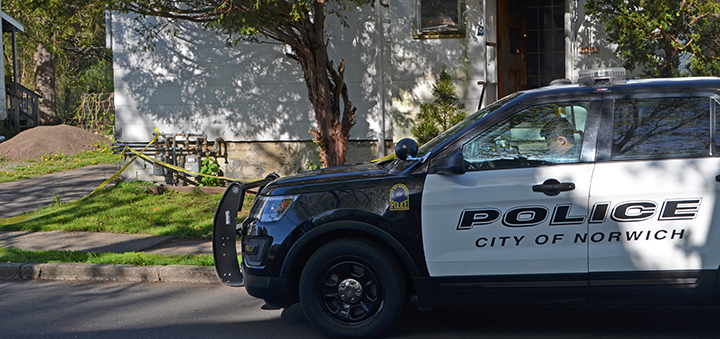Adoptions Are The Name Of The Game In 2024 For The Chenango SPCA
Published:
February 9th, 2024
By:
Sarah Genter
 The Chenango SPCA had a great year for adoptions, with 438 cats and 138 dogs adopted out. They also had their best month in their recorded history for adoptions, with 100 pets adopted in the month of October. (Photo by Sarah Genter)
The Chenango SPCA had a great year for adoptions, with 438 cats and 138 dogs adopted out. They also had their best month in their recorded history for adoptions, with 100 pets adopted in the month of October. (Photo by Sarah Genter)
CHENANGO COUNTY — The Chenango SPCA spent the past year making changes, planning for the future, and of course, caring for the animals of Chenango County.
The shelter was first founded in 1907, and its current location at 6160 County Road 32 in Norwich was acquired by the organization in 2000. Today, the Chenango SPCA has a staff of 11 part-time employees and one full-time director, as well as a handful of volunteers to care for the animals that come in and help them find loving, forever homes.
To achieve this goal, the shelter spent 2023 making some changes to improve their care for the animals, as well as make it easier than ever for individuals to adopt. With new state mandates on the horizon, they also plan to spend 2024 preparing for the future.
Development and support
In early 2023, the Chenango SPCA said goodbye to long-time Executive Director Annette Clarke, and brought on their new Executive Director Patrick McLaughlin.
McLaughlin’s background is in the education industry, with several years working at East Catholic High School in Manchester, Connecticut, where he taught for five years before becoming the director of campus ministry. He also gained experience with fundraising and the nonprofit world during his educational career.
Despite being new to the animal care field, he hit the ground running when he joined the SPCA and was able to implement positive change and hit milestones in his first year as director.
One significant change for the organization was beginning to do spay and neuter surgeries in-house, which McLaughlin said significantly cuts costs.
“We did receive a grant to do more spay and neuter surgeries here in the shelter, so we’ve actually doubled the frequency that we’re able to do that. As a result we can spay and neuter more of our own animals more quickly and more economically than by taking them to private vet clinics,” he said.
Thanks to the grant, the SPCA is able to bring in veterinarians twice a month, who spay and neuter about 15 to 20 animals in a day. Although their partnership with Pet Street Station Animal Hospital provides them a facility to have animals spayed and neutered at reduced rates, McLaughlin said it is still more affordable to perform them right at the shelter.
Community support also played a key role in the SPCA’s successful year. Zappone Subaru participated in the Subaru Loves Pets program in October, which allowed participating shelters to receive $100 per adoption, up to a total of $3,100.
“With the knowledge that we would be receiving that funding, we drastically reduced our adoption costs so that we could motivate people to adopt. We reduced prices from $155 for dogs to $31, and from $100 for cats to $13,” said McLaughlin. “That’s a huge reduction, and we were only able of course to provide an 80 percent discount because we knew we had money coming in from a business supporter.”
The reduced adoption fees had a major impact on their adoption rates for the month. McLaughlin said of the 15 years they’ve been keeping records, October had their highest amount of adoptions with a total of 100 cats and dogs adopted.
The shelter saw a great year for adoptions overall. Of the 447 cats and 251 dogs brought in to the shelter in 2023, 438 cats and 138 dogs were adopted back out. McLaughlin said many of the dogs were also runaways that they were able to reunite with their owners.
The success of 2023 seems to have carried over into the new year as well. In addition to helping hundreds of animals find homes, the high adoption rates also sparked a local anonymous donor to support the shelter’s efforts. In early 2024, the Chenango SPCA received a donation of $20,000 to reopen their Safe Haven Fund for Animals, which makes adoptions free while funds last.
“She was very encouraged by our high adoption numbers in October; we hit 100 adoptions in October which is the highest ever for us, at least since we’ve been keeping records,” said McLaughlin. “So she was thrilled with that and contacted me about reinitiating the Safe Haven Fund, so we could basically make it possible for people to come and, as long as they’re approved, money doesn’t have to stand in the way of their adoption.”
The hope is that adoption rates will spike again while funds last, which McLaughlin said will show the Safe Haven Fund is successful and hopefully elicit more donations to the program in the future.
“Based on our usual data for adoptions this will certainly not last a year. It’ll last a few months, and so I think a metric that we’re using to assess how effective the program is is to see if the adoption rate increases,” he said. “If the adoption rate increases then we say, yes, that was successful, and that helps our chances of getting another donation for the program in the future. If adoptions stay at the same rate then we’ll say, for whatever reason that might not be working and it might not be renewed.”
McLaughlin said one of the major benefits to the Chenango County area is the willingness of the community to do what they can to help, which was evident when members of the George Rider Hook and Ladder Company spent a day repairing dog kennels at the Chenango SPCA.
“The repairs were really concentrated on the back wall of our kennels. So each dog is in a kennel that has tile side walls and it had a certain kind of plastic backing on the back wall that over 20 or so years had been worn down by various dogs,” McLaughlin explained. “So we put up new paneling that hopefully will last a little bit longer and be a little bit more water tight, and safer for the dogs.”
He said volunteers were able to complete the repairs in just one day, which mitigated potential challenges with relocating the shelter animals during the project.
“They got the work done in one day. That was amazing to me as well because if it had been a multi-day project then the concern of what to do with the dogs while the work is going on would have been very difficult for us to address,” said McLaughlin. “But since they were able to get it all done in a single day, we could relocate the dogs throughout the building for that day and then put them back in the kennels in the evening.”
The support and hard work of the Hooks saved the SPCA from having to pay for the labor of the repairs, which just left the cost of materials. McLaughlin said the Hook and Ladder Company and individual volunteers donated $800 to the total $2,300 cost of materials.
“In house we don’t have the skill set to get it done, and paying to get it done would have really been a challenge for us. So they were the perfect route to fill that void at just the right time,” McLaughlin said.
The shelter has kept momentum in early 2024, and they hope to continue to make even more improvements, plan for the future, and adopt out more animals as the year goes on.
Plans for 2024
“The name of the game in 2024 is really going to be adoptions. Getting animals into new homes as quickly as possible,” said McLaughlin. “We do everything for them that we can here in the shelter, but at the end of the day this is not the place that they belong. They belong with families and it’s our job to make sure that we can find families for all of them.”
McLaughlin said he hopes the reactivation of the Safe Haven Fund will create a boost in adoption rates, which in turn may elicit further donations to the program, and keep adoption rates high.
“Hopefully we can continue to have really high adoption rates and get the animals out into homes if we can take the cost issue off the table,” he said. “There are plenty of people in the county who can provide a good home and are going to be loving adoptive pet parents, but our adoption fee ... can be a little bit prohibitive as a one-time cost. So taking that away, you know, we saw in October taking that away or reducing it substantially really had a huge impact on our adoption level, and so we’re hoping to see more of that with the Safe Haven Fund.”
In addition to the Safe Haven Fund, the SPCA is promoting adoption by making it easier than ever for individuals to apply to adopt a dog or cat from the shelter.
In 2023, McLaughlin updated the shelter’s adoption application to make it shorter and less intrusive. The prior application requested lots of background information and character references, which he said ultimately didn’t play a huge role in whether a potential adopter was approved or denied.
Instead, he hopes the shorter application will make individuals more likely to apply, and shelter staff will be relying more on in-person conversations with adopters to learn more about them and match them with a suitable animal.
“I’ve definitely had people tell me that they were dissuaded from adopting at all by the previous application, and so that’s something that we really would like to avoid,” he said. “We want people to be eager to adopt and to make that process as simple and fast as we can, while also obviously ensuring that our animals go to safe and happy homes.”
The shelter will also continue to provide further training to staff members. McLaughlin said finding and retaining staff generally isn’t a problem for the SPCA, and Shelter Manager and Licensed Vet Tech Kathy Wyder is often able to train employees beyond general care of the animals and maintenance of the facility.
“A trajectory might look like, you start off mainly focused on cleaning, feeding, walking, things like that. Let’s call those routine animal care tasks,” said McLaughlin. “With time you might start to move more in the behavioral direction and start working with animals to be more sociable, or you might start moving in sort of a more medical direction and take on a little bit more responsibility for managing medications and things like that.”
He also hopes support from the community will continue through 2024. With no government funding, the Chenango SPCA relies on fundraising efforts and community volunteering to keep the shelter going.
“I definitely think that one of the benefits of this area is the vibrancy of the community, the willingness to pitch in,” he said. “Sometimes there is strain on our economic resources, but in terms of the resources of community support and willingness to pitch in and help us to actually get things done, this community is fantastic for that. There’s a real strong sense of volunteerism and wanting to be involved in the good work that we do.”
Community support will be needed perhaps more than ever in the coming years, as the shelter is now facing a major capital project in response to new state mandates.
Companion Animal Care Standards Act
In December of 2022, Governor Kathy Hochul signed the Companion Animal Care Standards Act into law, which McLaughlin said will “drastically change the way things work in the animal sheltering industry throughout New York State.”
The mandate is based on the Guidelines for Standards of Care, which is a set of guidelines for shelter animal care from the Association of Shelter Veterinarians, and will “provide comprehensive standards of care for municipal shelters, not for profit humane societies, SPCAs and animal shelters, and not for profit animal rescues.”
It outlines several measures that must be implemented in all New York State shelters and rescues by 2025, including mandates related to licensing with the NYS Department of Agriculture and Markets’ Division of Animal Industry, personnel training, record keeping, facility standards, animal housing, sanitation, management protocols, animal husbandry, veterinary care, behavioral protocols, transportation standards and vehicle requirements, and foster care provider requirements.
“It’s going to require some very specific changes to the building so that we have large enough accommodations for all our animals. It’s also going to require changes related to sound proofing and air circulation, and also to the amount of time that humans spend with each animal each day,” said McLaughlin.
He said the shelter spent much of 2023 assessing their facility and making plans for what they need to do to comply with the Act, whether that’s facility additions, remodels, or both.
In July, she SPCA had a team of veterinarians from the Maddie’s Shelter Medicine Program at the Cornell College of Veterinary Medicine visit and assess the shelter. They provided recommendations on changes to the facility and how the shelter is run, to get the Chenango SPCA in compliance with the changing laws.
“They made a number of recommendations and there will have to be some substantial changes to the way things work around here. It’s a little bit scary because it’s a pretty big organization, and our work kind of renews on a daily basis because some animals come in and some animals leave. So institutional, large-scale change in terms of time spent with people and the physical changes to the building, it requires a lot of planning,” McLaughlin explained.
The SPCA will also need to decide on what exactly will be done to the facility and find contractors to complete any remodeling sooner rather than later. McLaughlin said their hope is to support local businesses, but ultimately it will come down to whether or not they have availability in the next two years.
“We’re going to have a lot of need pretty quickly I think,” he said. “We want to keep our services as local as possible because we are very grateful to benefit from the generosity of a lot of local companies, and also because if we’re going to give substantial business to a design firm or a contractor, we want to do that locally, of course.”
Making these changes will also require a significant amount of funding. McLaughlin said in past years the Higley Foundation has helped the organization make improvements to the current facility, and he hopes local foundations will continue to support them during the capital project.
Grant options are being explored, including the Companion Animal Capital Fund, which was established by the state to provide up to $500,000 to shelters for remodels, expansions, and other capital projects related to the new mandates.
However, even if the Chenango SPCA is awarded the grant, it’s still unclear just how much of the capital project costs it will cover. Compounding the issue is the ever-rising cost of supplies and services, which have already put a strain on the shelter’s resources.
Navigating challenges
With no government funding, the Chenango SPCA relies heavily on the generosity of the community. Fundraising and donations help the shelter to purchase supplies, provide veterinary care to the animals, and keep the facility operating.
However, due to inflation it’s only costing more to run the shelter. With inflation impacting the community as well, McLaughlin said it’s become harder to ask for donations.
“A lot of our supporters are retired people on a fixed income. It’s incredibly generous as all of their expenses are going up and their income isn’t really rising to meet that need, that they continue to give to us. The question is, how do you take that and move forward in a very large way to something like a big capital project?” he said.
“I think nonprofits in general have been hit pretty hard by inflation because whatever costs a nonprofit has, those costs have gone up, but the donors that we rely on for support have also had their costs go up,” he continued. “Asking them to give more is a very, very difficult thing to do. Some of them can do it, many of them can’t. Many of them send us $100 a year, and asking them for $200 is just not going to be possible.”
In an attempt to cut costs, McLaughlin said they recently made the tough decision to cut back their hours to four days a week.
“Since we are a community-supported organization that relies on fundraising, we often have to scrimp and save and be very careful with the money that we do have. As a result of some of that, we’ve made the tough decision to reduce our hours,” McLaughlin said. The shelter is now closed on Mondays, in addition to Thursday and Sunday. “We’ll obviously still have staff in here to care for the animals, but the cost of being open five days a week had become a little bit too much for us. Hopefully we can go back to that, but it does depend on our income, basically. So that’s a challenge.”
Although the decision will help financially, McLaughlin said there is a concern of a ripple effect that will impact adoption rates.
“The idea that we will facilitate adoptions while being open one fewer day a week makes the adoption part even more challenging,” he said. “So we’re going to have to try and schedule our appointments in four days instead of five, and hopefully we can generate enough walk-in traffic on those four days to keep the animals moving into their new homes as quickly as possible.”
Despite these challenges, the Chenango SPCA is charging ahead. Going forward, McLaughlin said he hopes to spread the word even more about the shelter and what they do to try to gain new supporters, rather than asking current donors for more.
“We have to diversify our support, and frankly we need to find people in our community who can become excited about our work who maybe right now don’t know what we’re doing at all, and hopefully we can expand our donor base instead of trying to ask the current donors to give more and more and more, because that’s not going to be sustainable,” he said.
“I’ve gotten the sense that there’s a group of people here in the county who are very loyal to us, and very dedicated to our work. But I think there’s a very large group who, for one reason or another, just don’t have very high awareness of what we’re doing or how necessary it is, how much help we’re able to provide to the animals, and the more we can tell that story and make the general public aware of us I think the more likely we are to find new friends and new donors.”
The SPCA will also be raising money through their annual fundraisers, including the Fur Ball in February, which made its comeback last year after a hiatus due to the COVID-19 pandemic. The event was a huge hit with more than 100 attendees, and McLaughlin is hoping for even more this year.
Woofstock made its return last year as well, and will be held again this fall. The summertime will bring the annual Paws and Pints fundraiser, an outdoor event with music, food, games, and refreshing beer at Hidden Springs Brewhouse in Norwich.
The SPCA will hold garage sales through the summer months as well, where used items are sold for whatever purchasers can afford. McLaughlin said he’s also exploring the possibility of adding a casino night fundraiser to their repertoire of annual events.
In addition to attending fundraisers or donating, there are other ways area residents can help. The SPCA is in contract with Chenango County municipalities to house stray dogs that are picked up by animal control, and McLaughlin said at certain times of the year the amount of dogs seized are more than the shelter can take in.
One of the ways dog owners in the area can help lighten the load is by preventing their dogs from becoming strays by microchipping and licensing their dogs, as well as ensuring they’re wearing ID tags.
“That’s a big help because dog control officers are allowed to return a dog to its home if it’s got a license and wearing it’s tag and all that. If it’s not, then they’re supposed to seize it,” McLaughlin explained. “You can get a dog easily and no one knows that you have a dog that you haven’t licensed. And plenty of people don’t realize that they’re supposed to license a dog, because really when you’re considering getting a pet, whose first impulse is to look up the law? No one’s.”
On the governmental end of things, McLaughlin said any government subsidies would be a huge help to the organization.
“We receive no subsidies or anything from any level of government. It might seem like a pipe dream, but if that were to happen it would be a huge help to us. The fact that there is no such support at the moment can put some strain on us,” he said. “I don’t know enough about how the wheels of government turn around here to know if that’s likely or even possible, but in terms of what they could do that would be a pretty big help.”
Although the Chenango SPCA has faced some challenges, and has some big changes on the horizon, the staff is not giving up. Every day they work hard to care for the animals that come through their doors and find them loving homes, which is their ultimate focus.
McLaughlin said although working at the shelter can be challenging, and even emotionally draining at times, seeing an animal recover from hardship and find their forever home is the greatest reward there is.
The Chenango SPCA is open to the public from noon to 4:30 p.m. on Wednesday, Friday, and Saturday, and from noon to 7 p.m. on Tuesdays.
For more information, visit ChenangoSPCA.org or the Chenango SPCA Facebook page. To contact the shelter, call 607-334-9724 or email cspcainfo@chenangospca.org.
Author: Sarah Genter - More From This Author
Comments






